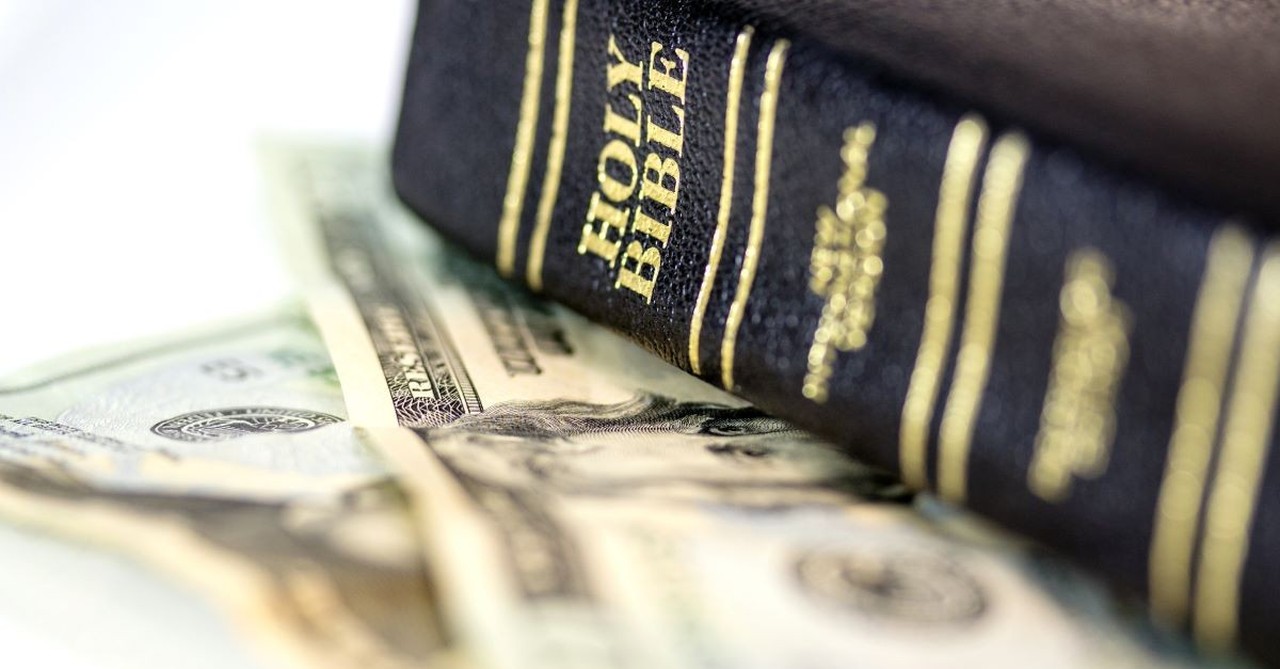
A popular idea permeating culture and society is that God wants each of us to be rich. The prosperity gospel teaches that the Lord blesses people with wealth and health if they are following Him in faith.
Many people are drawn to prosperity teachers because of the emphasis on material riches, especially if they have experienced poverty or desire a wealthy lifestyle.
Despite the popularity of prosperity teachers, Scripture never promises us that we will be wealthy for following Jesus. Yes, we will have spiritual riches.
However, our Savior and Lord did not have a permanent home to stay in during His earthly ministry and lived in poverty (Matthew 8:20). If God the Son lived like this on earth, then why should we assume that prosperous living is His will or expected norm for us?
Jesus spoke severely about the rich. He said it was harder for them to enter the kingdom of heaven than for a camel to go through the eye of a needle (Matthew 19:23-24). In other words, it is practically impossible for someone wealthy to receive salvation.
What is impossible with man, though, is possible with God (Matthew 19:25-26). Many prominent and wealthy individuals placed faith in Jesus (see Luke 19:1-9; John 7:50). However, their view of riches drastically changed.
A person who experiences a new life in Christ also experiences a shift in perspective regarding money. Thus, we see many of the early disciples give up all their earthly possessions to share what they had with others (Matthew 19:27; Acts 2:44; 4:32).
This might not happen instantly in our lives and may require an extended period of absorbing the teachings of Scripture. But a believer knows that a relationship with Jesus is more important than anything in life, including money.
How should Christians view and use their finances in light of their new life in Christ? Let’s examine five ways that the Bible changes what we think about money.
Photo Credit: ©iStock/Getty Images Plus/Sergey Nazarov
1. Money as a Gift to Use for Provision

1. Money as a Gift to Use for Provision
SLIDE 1 OF 5
Too often, we think of money in terms of what we have and earn. The money is ours and we get to decide how we spend and invest it. We become possessive of dollars and cents.
Scripture teaches us something different. According to the Bible, God gives us the ability to work and earn money so that we can buy the things we need in life (see Deuteronomy 8:18). Everything good comes from Him, so we can trust that an honest job that brings in sufficient income is a blessing from the Lord (James 1:17). He has provided a way for us to make a living for ourselves.
When we understand that money is a blessing and gift from God, our perspective of how we use it changes. No longer is it ours to accumulate and to use as a prop against an uncertain future.
Instead, we understand that we are stewards, and we should use what has been entrusted to us to provide for the necessities of life for ourselves, our families, and others we are responsible for.
If we squander our money on useless pursuits and fail to provide for those entrusted to us, we are worse than those who do not believe (1 Timothy 5:8).
As stewards, we understand that the money is not ultimately ours. It belongs to the Lord. When we recognize this truth, we are less likely to chase after money in anxious fear.
We will rest in the instruction to seek first the Kingdom of God, trusting that He will provide us with what we need (Matthew 6:33). Money is a gift that the Lord gives us to provide for our necessities and those of our families.
Photo Credit: ©Unsplash/Micheile Henderson
2. Money as a Resource to Invest in Eternity

2. Money as a Resource to Invest in Eternity
SLIDE 2 OF 5
Lots of Christians have heard sermons about the biblical concept of giving. At times, though, it can seem as if we have grown cold to the biblical reason for giving. People become irritated or frustrated that the church, pastors, and Christian teachers keep telling them how to use their money.
Yet, a biblical view of giving should produce joy and praise in the life of a believer. We are not just giving our money to a church or organization — we are investing in eternity.
As Jesus taught, “Do not store up for yourselves treasures on earth, where moths and vermin destroy, and where thieves break in and steal. But store up for yourselves treasures in heaven, where moths and vermin do not destroy, and where thieves do not break in and steal. For where your treasure is, there your heart will be also” (Matthew 6:19-21).
There are many ways to store up treasures for ourselves in heaven. One way is by giving from our resources. We see this in Scripture, in which many of the early Christians sold property to support the work of the church and those who were poor (Acts 4:34-37).
The Apostle Paul also collected money from the different churches, encouraging them to give with joy and in the amount they decided within their hearts (2 Corinthians 9:7).
Their inspiration for giving was the Lord Jesus (2 Corinthians 8:8-12). For our sake, Christ became poor and gave His life so we could become rich with spiritual blessings (2 Corinthians 8:9).
Although in a sense, we do not “own” our money because God gives us the ability to work and make money, we act as wise stewards by investing in what will not decay or be stolen.
Every Christian, rich or poor, should seek to be generous with their money, trusting that they are laying up true treasure for themselves (1 Timothy 6:18-19). What we do with our money impacts eternity.
Photo Credit: ©Getty Images/ADragan
3. Money as a Temporary Reality We Should Use Wisely

3. Money as a Temporary Reality We Should Use Wisely
SLIDE 3 OF 5
Money can be used to store up treasures for ourselves in heaven, but our bank accounts will not continue in eternity. No matter how much money we accumulate on earth, we will not take it with us when we die. Neither will our cash be raised at the resurrection.
We act foolishly, then, by pursuing riches. Not only will our money not come with us in eternity, but the love of money leads to many sins and sorrows (1 Timothy 6:7, 9-10).
Why spend our lives chasing after something that will not last and only causes pain? The wise Christian practices contentment — satisfaction with having what they need (1 Timothy 6:6, 8).
Understanding what the Bible says about money and its temporary nature changes how we use our bank accounts.
Although there is nothing wrong with sometimes buying things we want or using a portion of our money for a fun event, believers should avoid wasting and squandering their resources.
We should carefully consider what we buy and use our money for. Are our spending habits honoring God? Are we wasting precious resources that could be used for something better?
Considering these questions is even more important for those of us who live in first-world countries that generally have greater amounts of wealth.
Most of us have more than what we need while others in the world struggle to have the basics to survive. This puts many purchases and spending habits into perspective. For example, do we need to pay hundreds of dollars for a new shirt or phone?
Also, what we spend our money on has the power to influence the lives of those who work to create the products we buy. If we know that a certain company uses child labor or exploits workers, then we should not purchase products from that organization or brand.
By withholding our money, we are making a statement that we do not endorse their oppressive treatment of others.
The more we gain a biblical understanding of finances, the more we will seek to wisely use our money.
Photo Credit: ©iStock/Getty Images Plus/William_Potter
4. Money as a Tool to Bless Others

4. Money as a Tool to Bless Others
SLIDE 4 OF 5
Connected to the views that we are stewards of our finances, that we can invest in eternity, and that money is a temporary reality, is the biblical teaching that we should care for the poor and needy (Deuteronomy 15:11; Proverbs 14:31; 19:17; James 1:27; 1 John 3:17).
As I mentioned in point number three, most believers in America have more than they need. We can use the extra money we have as a tool to bless others.
Giving to help “the least of these” may not come naturally to us. Our default response according to our sinful nature is to grasp and hoard our resources, crying “mine” to the request of others who hold out their hands for help.
However, in Jesus, we have new life (2 Corinthians 5:17). Christians can choose to respond to those who are hurting and in need with open hearts and hands.
Of course, being wise with our money means doing our research and ensuring that the organizations, ministries, and charities we give to are financially honest and reliable.
We should exercise discernment and investigate how organizations use their resources. Praying is also essential, as we should give according to how God leads us.
For some ideas of organizations that serve the poor and those in need, consider what ministries are serving locally. Perhaps there is a homeless ministry that seeks to help those who are living on the streets while also sharing the gospel with them.
Or maybe there is a ministry for at-risk youth that helps prepare them for a better future and reminds them of their God-given worth. Internationally, many charities and organizations exist that serve the poor and the “least of these.” Lots of these also commit to sharing the gospel and Jesus’ love.
The important thing is to be obedient to the Lord as He has taught us in Scripture. We know that whatever we do for the “least of these” is the same as serving Christ (Matthew 25:40). If we ignore the plight of those in need locally and around the world, then we are not acting in obedience or love.
Photo Credit: ©Unsplash/Tom Parsons
5. Money as an Offering to Give in Worship of God

5. Money as an Offering to Give in Worship of God
SLIDE 5 OF 5
God has no use for money. He does not need to buy or sell anything, nor does he require money to survive. Yet, we can offer our money to God as an act of worship.
When the poor widow dropped her two coins into the temple treasury box, she gave all she had (Mark 12:43-44; Luke 21:3-4). Jesus commended her for this act. This widow, more than the others who gave from their wealth, knew that God was greater than all, including money (and her lack thereof).
Giving can be an act of worship when we give from the heart and offer what we have to the Lord. He is all-sufficient and does not need our money.
But He delights in what we give Him like a parent lovingly accepting a handmade gift from their child — a gift created from supplies and products that the parent purchased. Such a gift is not required but is given as an expression of love.
Believers have numerous reasons to glorify and worship God through their giving. We are redeemed individuals, people who were originally slaves to sins but set free in Christ (Romans 6:18; Galatians 5:1). Because of Jesus’ death and resurrection, we have innumerable spiritual riches (2 Corinthians 8:9).
We are no longer rebels and foreigners to God, but beloved sons and daughters (John 1:12-13). Overflowing love and praise for Jesus should lead us to give freely of ourselves and resources, including our money.
So, the next time we give at our local church or send money to a ministry, let us not do so grudgingly or with regret.
How we view and use our money stems ultimately from what we believe about the Lord. If we love Him and want to worship Him with all we have, then we will give cheerfully and generously.
He has given us so much in saving us, that we cannot help but give from what we have, even if the gift seems small in the eyes of others.
Photo Credit: ©GettyImages/Enterline Design Services LLC

Originally published April 18, 2024.







